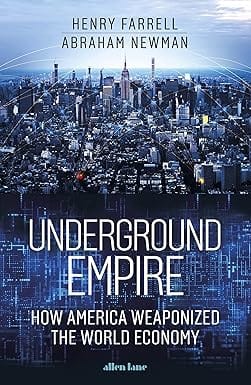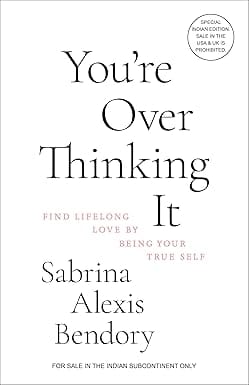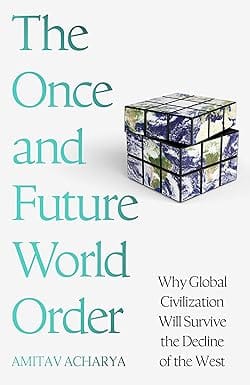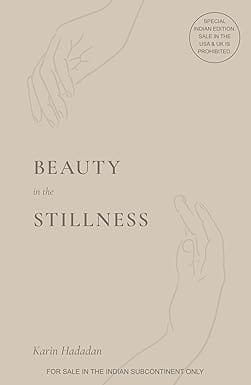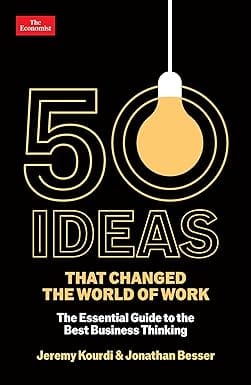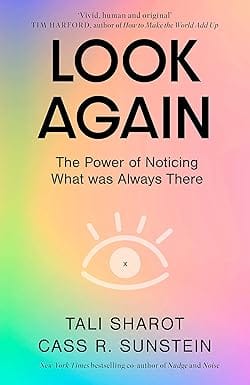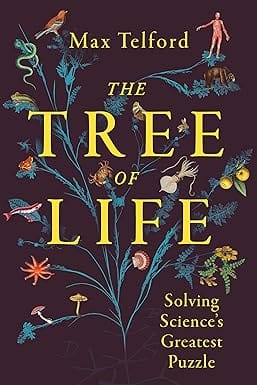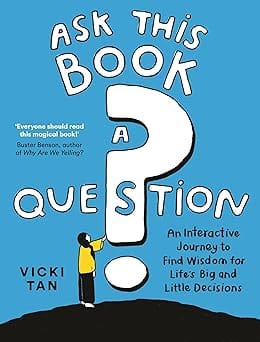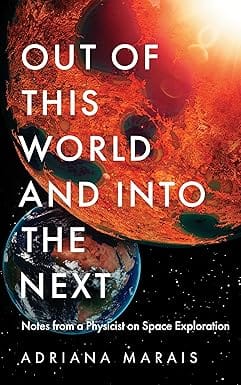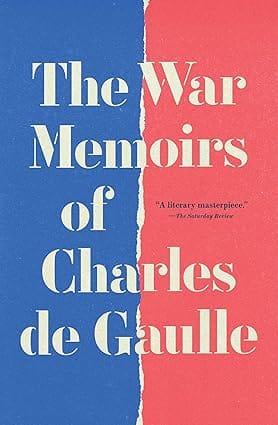- Contemporary Fiction
- Contemporary Fiction
- Children
- Children
- Comics & Graphic Novels
- Comics & Graphic Novels
- Non-Fiction
- Non-Fiction
- Fiction
- Fiction
'Captivating… The stuff of thrillers' - the Financial Times
An explosive new vision of geopolitics from two trail-blazing political scientists
Deep beneath our feet, vast and sprawling, lies one of the most sophisticated empires the world has ever known. At first glance, it might not look like much - it is made up of fibre optic cables and obscure payment systems. But according to prominent political scientists Henry Farrell and Abraham Newman, the United States has turned the most vital pathways of the world economy into tools of domination over foreign businesses and countries, whether they are rivals or allies, allowing it to maintain global supremacy.
Drawing on original reporting and ground-breaking research, Farrell and Newman explain how this underground empire has allowed the United States to eavesdrop on other countries and isolate its enemies. Now, efforts by countries such as China and Russia to untether themselves from this coercive US-led system are turning the global economy into a battle zone. Today's headlines about trade wars, sanctions, and controls on technology exports are merely tremors hinting at far greater seismic shifts beneath the surface, as we sleepwalk into a dangerous new struggle for empire.
Essential reading for anyone who wants to understand how power is wielded today, Underground Empire weaves together tales of economic conflict, shadowy surveillance and covert infrastructure projects to explain how the world order has been brought to the brink of chaos - and how we might find a way back from the edge.
Review
The sharpest and most striking analysis I've seen in years of the state the world's in, cunningly disguised as a user-friendly business book -- Francis Spufford, author of GOLDEN HILL
Henry Farrell and Abraham Newman paint a persuasively alarming picture of just how American power has become entrenched deep in the plumbing of the world economy. Underground Empire is a passionate plea for restraint and reform in the face of a world burdened by all kinds of geopolitical dangers -- Helen Thompson
Farrell and Newman's book is like an MRI or CT scan of recent world history, giving us a new and startling image of the global body politic, as clear as an X-ray. Cognitive mapping takes on a new aspect with their analysis, as they shift from the technological to the historical, showing both how this new nervous system of world power came to be, and how it could be put to better use than it is now. Given the intertwined complexities of our very dangerous polycrisis, we need their insights -- Kim Stanley Robinson, author of THE MINISTRY FOR THE FUTURE
Underground Empire tells a riveting story about the deep forces that have shaped our present moment. The book is a portrait not of a single protagonist or event, but rather a system that shapes much of the world today: a web of dollars and data that has, half accidentally, given the United States a new kind of geopolitical control over both its enemies and allies. It is history written in its most powerful form: a view of the recent past that gives us a new lens to better discern our future -- Steven Johnson, author of HOW WE GOT TO NOW
Captivating… The stuff of thrillers - The Financial Times
If you want to understand where the world economy has been and where it may be headed, you need to read this book -- Dani Rodrik, Ford Foundation Professor of International Political Economy - X Published On: 2023-09-22
About the Author
Abraham L. Newman is a professor at the School of Foreign Service and Government Department at Georgetown University. He is a 2022-2023 Berlin Prize winner and his work has been published in leading outlets like The New York Times, The Financial Times, The Washington Post, Nature, Science, Foreign Affairs, Foreign Policy, Harvard Business Review, and Politico.
- Home
- Non-Fiction
- Underground Empire How America Weaponized The World Economy
Underground Empire How America Weaponized The World Economy
SIZE GUIDE
- ISBN: 9780241624517
- Author: Henry Farrell Abraham Newman
- Publisher: Allen Lane
- Pages: 288
- Format: Hardback
Book Description
'Captivating… The stuff of thrillers' - the Financial Times
An explosive new vision of geopolitics from two trail-blazing political scientists
Deep beneath our feet, vast and sprawling, lies one of the most sophisticated empires the world has ever known. At first glance, it might not look like much - it is made up of fibre optic cables and obscure payment systems. But according to prominent political scientists Henry Farrell and Abraham Newman, the United States has turned the most vital pathways of the world economy into tools of domination over foreign businesses and countries, whether they are rivals or allies, allowing it to maintain global supremacy.
Drawing on original reporting and ground-breaking research, Farrell and Newman explain how this underground empire has allowed the United States to eavesdrop on other countries and isolate its enemies. Now, efforts by countries such as China and Russia to untether themselves from this coercive US-led system are turning the global economy into a battle zone. Today's headlines about trade wars, sanctions, and controls on technology exports are merely tremors hinting at far greater seismic shifts beneath the surface, as we sleepwalk into a dangerous new struggle for empire.
Essential reading for anyone who wants to understand how power is wielded today, Underground Empire weaves together tales of economic conflict, shadowy surveillance and covert infrastructure projects to explain how the world order has been brought to the brink of chaos - and how we might find a way back from the edge.
Review
The sharpest and most striking analysis I've seen in years of the state the world's in, cunningly disguised as a user-friendly business book -- Francis Spufford, author of GOLDEN HILL
Henry Farrell and Abraham Newman paint a persuasively alarming picture of just how American power has become entrenched deep in the plumbing of the world economy. Underground Empire is a passionate plea for restraint and reform in the face of a world burdened by all kinds of geopolitical dangers -- Helen Thompson
Farrell and Newman's book is like an MRI or CT scan of recent world history, giving us a new and startling image of the global body politic, as clear as an X-ray. Cognitive mapping takes on a new aspect with their analysis, as they shift from the technological to the historical, showing both how this new nervous system of world power came to be, and how it could be put to better use than it is now. Given the intertwined complexities of our very dangerous polycrisis, we need their insights -- Kim Stanley Robinson, author of THE MINISTRY FOR THE FUTURE
Underground Empire tells a riveting story about the deep forces that have shaped our present moment. The book is a portrait not of a single protagonist or event, but rather a system that shapes much of the world today: a web of dollars and data that has, half accidentally, given the United States a new kind of geopolitical control over both its enemies and allies. It is history written in its most powerful form: a view of the recent past that gives us a new lens to better discern our future -- Steven Johnson, author of HOW WE GOT TO NOW
Captivating… The stuff of thrillers - The Financial Times
If you want to understand where the world economy has been and where it may be headed, you need to read this book -- Dani Rodrik, Ford Foundation Professor of International Political Economy - X Published On: 2023-09-22
About the Author
Abraham L. Newman is a professor at the School of Foreign Service and Government Department at Georgetown University. He is a 2022-2023 Berlin Prize winner and his work has been published in leading outlets like The New York Times, The Financial Times, The Washington Post, Nature, Science, Foreign Affairs, Foreign Policy, Harvard Business Review, and Politico.
User reviews
NEWSLETTER
Subscribe to get Email Updates!
Thanks for subscribing.
Your response has been recorded.

India's Iconic & Independent Book Store offering a vast selection of books across a variety of genres Since 1978.
"We Believe In The Power of Books" Our mission is to make books accessible to everyone, and to cultivate a culture of reading and learning. We strive to provide a wide range of books, from classic literature, sci-fi and fantasy, to graphic novels, biographies and self-help books, so that everyone can find something to read.
Whether you’re looking for your next great read, a gift for someone special, or just browsing, Midland is here to make your book-buying experience easy and enjoyable.
We are shipping pan India and across the world.
For Bulk Order / Corporate Gifting
 +91 9818282497 |
+91 9818282497 |  [email protected]
[email protected]
Click To Know More
INFORMATION
QUICK LINKS
ADDRESS
Shop No.20, Aurobindo Palace Market, Near Church, New Delhi

